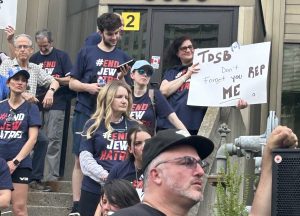 TORONTO — Rabbi Shlomo Gemara, rosh yeshiva of Yeshivat Or Chaim and Ulpanat Orot, spends almost 13 hours a week in the school’s classrooms teaching Talmud.
TORONTO — Rabbi Shlomo Gemara, rosh yeshiva of Yeshivat Or Chaim and Ulpanat Orot, spends almost 13 hours a week in the school’s classrooms teaching Talmud.
A few years ago, because he was not teaching as much, he felt like he was losing contact with the students, he said in an interview in his office at Or Chaim, the Orthodox boys’ high school that, together with Ulpana, forms Toronto’s Bnei Akiva high schools.
 A native of Petach Tikva, Rabbi Gemara came to Toronto in 1993 as a shaliach for a four-year stint at the school. After returning to Israel for two years, the school brought him back, and he’s been there ever since.
A native of Petach Tikva, Rabbi Gemara came to Toronto in 1993 as a shaliach for a four-year stint at the school. After returning to Israel for two years, the school brought him back, and he’s been there ever since.
The 49-year-old rabbi was introduced to teaching at a young age when, as a Grade 9 student during the Yom Kippur War in 1973, he and some friends were asked to teach Grade 3 and 4 students because there was a shortage of teachers.
“We thought it would be fun,” he recalls. At the time, he was a youth group leader in the Bnai Akiva movement.
The interaction with students and the feeling that he was making a difference were more compelling than he expected. “I actually fell in love with teaching, and it was quite clear to me that I would like to teach in the future.”
An alumnus of Bar-Ilan University, where he obtained a bachelor’s degree in mathematics, Rabbi Gemara received his rabbinic ordination and teaching qualifications at Kerem B’Yavneh, a hesder yeshiva that combines Torah study with army service.
It may just be coincidence that Rabbi Gemara teaches Gemarah (part of the Talmud), but it seems to be serendipitous as well.
He said that – although he’s never been among them – “many people believe that Talmud is one of the most boring subjects.”
“I believe this is one of the most exciting subjects, if you teach it properly. It deals with real issues in life, it gives you historical perspective on things, and it forces you to think, which is the most important asset that I believe a high school should equip students with.
“I think my goal in teaching Gemarah is very clear, and this is really to make students understand the text in a precise way, and at the end of the shiur [lesson], I would like them to take something to their own life from the class.”
Rabbi Gemara, who says he still understands and can relate to issues of teenagers, believes in using humour as a teaching tool. One year, his students in Israel presented him with a book of his jokes that they had compiled.
Over the past five years, spending time as a rabbi-in-residence at Jewish summer camps, he has become “much more aware of the power of informal activities” and has begun to incorporate more of them into the school.
He also believes in encouraging students to ask questions and express their values.
Last December, at Limmud: A Festival of Jewish Learning and Culture, he offered a Jewish take on John Lennon’s song “Imagine.”
The topic, an unlikely one for an Orthodox rabbi, came to his attention a few years ago when an Ulpana student read from the song at a school event.
Rabbi Gemara, who was only somewhat familiar with the tune, decided he needed to address the issue quickly, after a shaliach at the school immediately decried the song as heresy.
Doing as much research as he could during a short window of time, within 90 minutes the rabbi was presenting a shiur to the students. Since then Rabbi Gemara – who also teaches adults at Mekorot, a Jewish learning institute for women – has also addressed the topic at a North American principals’ conference.
He noted that “Imagine” raises “many issues that our sages dealt with. They came up with completely different solutions and ideas, but the questions and the discussion are important, and [students] should know that there are people who think differently.” He added that such issues are an adjunct to the school’s main focus of teaching Torah.
“I think our job as a Modern Orthodox school is to show students that the outer world has a lot to offer, but you have to be well prepared and well informed in order to really synthesize the outer world and the Torah world together.”
A lesson from the teacher: “I wouldn’t be afraid to take any text or any value from the outer world and to confront it with our [Jewish] values, and maybe to learn something good … Torah values are going to be confronted in the future, and to ignore this confrontation might be disastrous, if students are not prepared to answer and to criticize and to think.”
“They are our teachers… “ will return at the end of September.






